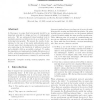456 search results - page 52 / 92 » Generating high performance pruned FFT implementations |
IJNSEC
2007
13 years 8 months ago
2007
In this paper, we argue that heterogeneity should be an important principle in design and use of cryptographic protocols. We use automated formal analysis tools to randomly genera...
AEI
1999
13 years 8 months ago
1999
Design synthesis represents a highly complex task in the field of industrial design. The main difficulty in automating it is the definition of the design and performance spaces, i...
IPL
2002
13 years 8 months ago
2002
Splay trees are self-organizing binary search trees that were introduced by Sleator and Tarjan [12]. In this paper we present a randomized variant of these trees. The new algorith...
ML
1998
ACM
13 years 8 months ago
1998
ACM
We review the application of statistical mechanics methods to the study of online learning of a drifting concept in the limit of large systems. The model where a feed-forward netwo...
JSC
2011
12 years 11 months ago
2011
In 1974, Johnson showed how to multiply and divide sparse polynomials using a binary heap. This paper introduces a new algorithm that uses a heap to divide with the same complexit...



